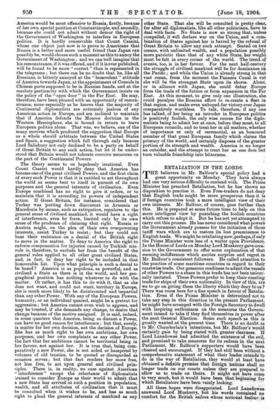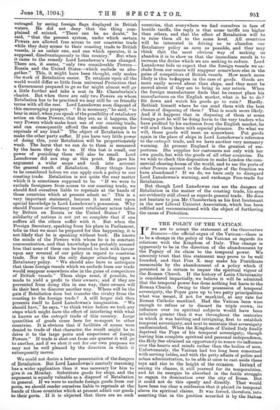T HE believers in Mr. Balfour's special policy had a great
opportunity on Monday. They have always had one very serious difficulty to contend with. The Prime Minister has preached Retaliation, but he has shown no disposition to practise it. Even Free-traders do not deny that English trade might be more prosperous than it is if foreign countries took a more intelligent view of their own interests. Mr. Balfour, of course, goes further than this. He is prepared at some future time to help on this more intelligent view by punishing the foolish countries which refuse to adopt it. But he has not yet attempted to carry out this process. He has never considered what powers the Government already possess for the initiation of those tariff wars which are to restore its lost preeminence to English trade. We might be retaliating now, perhaps, if only the Prime Minister were less of a waiter upon Providence. In the House of Lords on Monday Lord Muskerry gave occa- sion to the Government to offer some explanation of that seeming indifference which excites surprise and regret in Mr. Balfour's consistent followers. He called attention to the practice of some maritime countries in regard to their coastwise trade. Our generous readiness to admit the vessels of other Powers to a share in this trade has not been univer- sally imitated. These Powers prefer to keep their coasting trade for ships of their own nationality. In view of this, are we to go on giving them the liberty which they deny tons ? There was room here for a fine speech in favour of Retalia- tion. Even if the Prime Minister is determined not to take any step in this direction in the present Parliament, he might have arranged. with the Foreign Secretary to dwell with inspiring enthusiasm on the measures the Govern- ment intend to take if they find themselves in power after the next General Election. Some such speech as this is greatly wanted at the present time. There is no doubt as to Mr. Chamberlain's intentions, but Mr. Balfour's would certainly gain by being stated with greater clearness. If Lord Lansdowne had admitted the existence of the evil, and promised to take measures for its redress in the next Parliament, Mr. Balfour's supporters would have been cheered and encouraged. If they had still been Without a comprehensive statement of what their leader intends to do in the way of Retaliation, they would at least have obtained a definite promise that foreign nations shall no longer trade on our coasts unless they are prepared to allow us to trade on theirs. It might not have wine to very much, but it would have been that beginning for which Retaliators have been vainly looking.
All these hopes were disappointed. Lord Lansdowne answered Lord Muskerry, but his words contained no comfort for the British sailors whose national feeling is outraged. by seeing foreign flags displayed in British waters. He did not deny that the thing com- plained of existed. "There can be no doubt," he said, "that the present system, under which certain Powers are allowed free access to our coastwise trade while they deny access to their coasting trade to British vessels, is an unfair one, and one which operates, it is supposed, disadvantageously to this country.' But when it came to the remedy Lord Lansdowne's tone changed. There are, it seems, "only two considerable Powers— Russia and the United States—which exclude us alto- gether." This, it might have been thought, only ,makes the work of Retaliation easier. To retaliate upon all the world would differ so little from universal Protection that a Government prepared to go so far might almost well go a little further and take a seat in, Mr. Chamberlain's chariot. But when there are only two Powers on whom Retaliation has to be practised we may still be on friendly terms with all the rest. Lord Lansdowne soon disposed of this encouraging prospect. "It is necessary," he said," to bear in mind, when you speak of the possibility of retaliatory action on these Powers, that they are, as it happens, the very Powers which make least use of our coasting trade, and can consequently afford the smallest margin for reprisals of any kind. The object of Retaliation is to make the other party suffer. If you have very little power of doing this, your Retaliation will be proportionately weak. The harm that we can do to them is measured by the harm they do to us. If this last is small, our power of punishing them will also be small. Lord Lansdowne did not stop at this point. He gave his argument a wider scope and took into account the general result of Retaliation. Many things have to be considered before we can apply such a policy to our coasting trade. Retaliation is not quite the easy matter which it is sometimes supposed to be. "If we were to exclude foreigners from access to our coasting trade, we should find ourselves liable to reprisals at the hands of those countries which at present admit us." This is a very important statement, because it must rest upon special knowledge in Lord Lansdowne's possession. Why should France or Germany resent retaliatory action taken by Britain on Russia or the United States ? The solidarity of nations is not yet so complete that if one suffers all the others suffer with it. But when the Foreign Secretary, speaking from his place in Parliament, tells us that we must be prepared for this happening, it is not likely that he is speaking without book. He knows the minds of the Powers with whom he is in constant communication, and that knowledge has probably assured him that none of them can be trusted to look with favour upon any reversal of our policy in regard to coastwise trade. Nor is this the only danger attending upon. a Retaliatory policy. "We should also have to anticipate that those foreign vessels which we exclude from our trade would reappear somewhere else in the guise of competitors of British vessels." These ships must, if possible, be made to yield a profit to their owners ; and if they are prevented from doing this in one way, their owners will do their best to discover another way. Where will be the gain if Retaliation does but transfer the rivalry from the coasting to the foreign trade ? A still larger risk then presents itself to Lord Lansdowne's imagination. "We should have," he says, "to think twice before we took any steps which might have the effect of interfering with what is known as the entrepiit trade of this country. Large quantities of goods come here for re-export to other countries. It is obvious that if facilities of access were denied to trade of that character, the result might be to drive it to the large ports and emporiums of foreign Powers." If trade is shut out from one quarter it will go to another, and if we shut it out for our own purposes we may not be well pleased by the direction in which it subsequently moves.
We could not desire a better presentation of the dangers of Retaliation. But Lord Lansdowne's masterly reasoning has-a wider application than it was necessary for him to give it on Monday. Substitute goods for ships, and the argument is equally valuable as a disproof of Retaliation in general. If we were to exclude foreign goods from our ports, we should render ourselves liable to reprisals at the hands of those countries which at present admit our goods to their ports. If it is objected that there are no such countries, that everywhere we find ourselves in face of hostile tariffs, the reply is that some tariffs are higher than others, and that the effect of Retaliation will be to raise them all to the same level. All countries will be interested in driving us to abandon our Retaliatory policy as soon as possible, and they may think that the most obvious way of making us abandon it is to show us that the immediate result is to increase the duties which we are seeking to reduce. Lord. Lansdowne bids us expect that the foreign vessels we ex- clude from our coasts will reappear somewhere else in the guise of competitors of British vessels. How much more likely is this tolhappen in the case of goods. Goods are more easily moved about than ships, and they must be moved about if they are to bring in any return. When the foreign manufacturer finds that he cannot place his manufactures on the English market, what is he to do ? Sit down and watch his goods go to ruin? Hardly. Bethink himself where he can send them with the best chance of disposing of them ? That is much more likely. And if it happens that in disposing of them at some foreign port he will be doing harm to the very traders who have profited by his exclusion from the English market, he will send them there with especial pleasure. Do what we will, those goods will meet us somewhere. Put goods again in the place of ships in Lord Lansdowne's reference to the entrepot trade, and we have another very necessary warning. At present England is the greatest of em- poriums. She supplies her customers not only with her own goods, but with the goods of all other countries. Do we wish to check this disposition to make London the com- mercial clearing-house of the world, and to see the ports of other Powers succeed to the discharge of the function we have abandoned ? If we do, we have only to disregard Lord Lansdowne's warning, and exchange Free-trade for Retaliation.
But though Lord Lansdowne can see the dangers of Retaliation in the matter of the coasting trade, his eyes are evidently still closed as regards general trade. He does not hesitate to join Mr. Chamberlain as his first lieutenant in the new Liberal Unionist Association, which has been refitted and recommissioned with the object of furthering the cause of Protection.







































 Previous page
Previous page